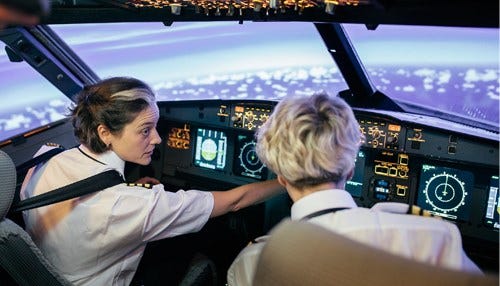Technology Teaching ‘Plane English’ to Pilots
 (Stock image courtesy: Purdue University)
(Stock image courtesy: Purdue University)
Subscriber Benefit
As a subscriber you can listen to articles at work, in the car, or while you work out. Subscribe NowTwo Purdue University alumni are helping new pilots learn radio communication skills so they can better interact with air traffic controllers. They have created an aviation radio simulator to teach what is known as “Plane English.” The program coaches rookie pilots to better understand and become more proficient in the specific phraseology associated with flying.
“If you wanted to practice how to talk on the radio if you’re a pilot, there is no good way to do that unless you’re flying. And when you’re flying, being a student you’re busy learning how to fly, so you don’t dedicate time to the talking part,” said Muharrem Mane, one of the creators of PlaneEnglish.
Mane, an alumnus from Purdue’s School of Aeronautics and Astronautics, and Eren Hadimioglu, a graduate from the School of Aviation and Transportation Technology, created and developed the app-based tool. Both are licensed pilots.
Mane says pilots in training focus more on the technique of flying when in the air, and often miss out on the cadence, intonation, and parlance coming from air traffic controllers. "It’s very minimal pieces of information that you need to keep clear, understandable and short, so there is no confusion because air traffic controllers are managing a lot of traffic, especially at busier airports."
When using the software, users are required to respond properly in specific situations, using the correct phraseology, and speech rate. Mane says there can be as many as five or six exchanges back and forth with air traffic control. Then users are graded on those responses.
“English is the language of aviation,” said Mane. The developer says that all pilots around the globe who fly commercially must know and understand the English language, a requirement of the International Civil Aviation Organization.
“We have been analyzing audio training files from the FAA and ICAO and using that data to establish our grading metrics to help users achieve the necessary communication skills to increase their radio proficiency and aviation safety,” Mane said.
The technology is primarily for student pilots, but it’s also available to veteran pilots who may have not been in the air for a while. Mane says he’s heard from several international airlines who interested in possibly using the technology to train their pilots.
“We have heard from users that they improve their radio communication skills in one hour through our platform than they do in flying for a dozen hours,” said Mane.
The creators of PlaneEnglish are working with the Purdue Research Foundation as they develop their technology.
Mane says the technology gives students a real world feel of listening to air traffic control.
